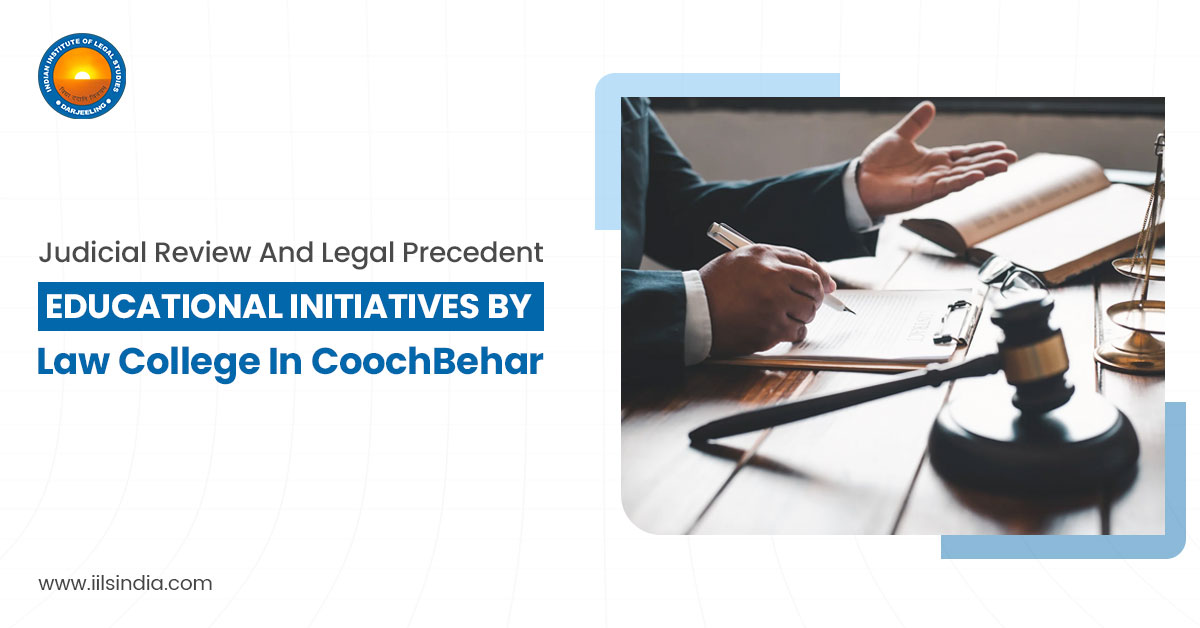Introduction :
A vital aspect of the Indian judicial system is judicial review that ensures that laws and regulations comply with the Constitution. Judicial review’s establishment of precedents exerts an enormous impact on how the law is interpreted and applied. It is the responsibility of law colleges to educate future lawyers on these subjects. The study examines the instructional initiatives undertaken by Indian Institute of Legal Studies as one of the finest law colleges in Coochbehar to promote an understanding of judicial review and legal precedents.
Importance of Judicial Review and Legal Precedent :
- Guardianship of the Constitution: Judicial review is a procedure through which the judiciary may overturn unconstitutional laws and acts, protecting individual’s fundamental rights.
- Creation of Legal Precedents: Courts generate precedents in law through judicial review that serve as authoritative guidelines for cases in future years and promote consistency and predictability in the legal system. Ensuring Justice and Equality: A more equitable society is determined by legal precedents that are formed through judicial review, and frequently address issues of equality, social justice, and human rights.
Educational Initiatives by Law Colleges in Coochbehar
Courses Structure and Curriculum Creation :
- Specialized Course: Offering specialized courses on constitutional law, judicial review, and legal precedents to provide in-depth knowledge.
- Case Law Method: Incorporating historic judgments and rulings from courts in the curriculum helps students understand how judicial review works in everyday life.
Moot Court Competitions :
- Simulated Court Proceedings: Students may practice and use their understanding by participating in moot court competitions which concentrate on judicial review cases and constitutional concerns.
- Judgment Evaluation: To promote a deeper knowledge of judicial reasoning, students are encouraged to analyze and present arguments grounded in previous legal precedents.
Legal Research and Publications :
Research Projects- Assigning research projects and dissertations on topics related to judicial review and legal precedents to promote scholarly inquiry and critical thinking. Law Journals- Publishing student research in college law journals, providing a platform for discussing judicial review and its impact.
Workshops and Seminars :
Expert Lectures- Hosting lectures and seminars by legal experts, judges, and academicians to discuss recent developments and landmark cases in judicial review. Interactive Sessions- Organizing interactive workshops where students can engage in debates and discussions on constitutional issues and legal precedents.
Legal Aids :
Practical Exposure- Running legal aid clinics where students assist in real cases involving judicial review, offering practical experience and understanding of the legal process. Community Education- Conducting awareness programs for the local community on their constitutional rights and the role of judicial review in protecting those rights.
Internships and Court Visits :
Judicial Internships- Facilitating internships with courts, law firms, and NGOs working on constitutional law cases to provide hands-on experience. Court Visits- Organizing visits to higher courts to observe judicial proceedings and understand the practical application of judicial review.
Conclusion :
The educational initiatives undertaken by Indian Institute of Legal Studies as one of the finest law colleges in Coochbehar are vital in shaping competent legal professionals who understand the significance of judicial review and legal precedents. By incorporating a mix of theoretical knowledge, practical training, and community engagement, these institutions ensure that students are well-prepared to uphold the principles of justice and constitutional integrity in their future careers. Through these efforts, law colleges in Coochbehar contribute significantly to the legal landscape and the broader society.

